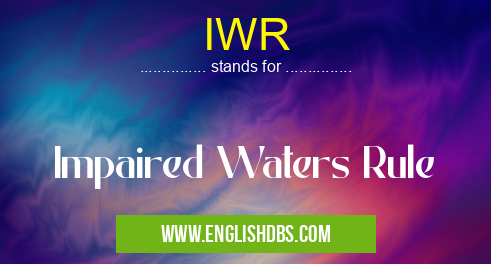What does IWR mean in UNCLASSIFIED
Impaired Waters Rule (IWR)

IWR meaning in Unclassified in Miscellaneous
IWR mostly used in an acronym Unclassified in Category Miscellaneous that means Impaired Waters Rule
Shorthand: IWR,
Full Form: Impaired Waters Rule
For more information of "Impaired Waters Rule", see the section below.
The Impaired Waters Rule (IWR) is a regulation promulgated by the United States Environmental Protection Agency (EPA) that establishes the requirements for identifying and listing impaired waters, and for developing Total Maximum Daily Loads (TMDLs) to address the impairments.
What is IWR?
The IWR defines an impaired water as a body of water that does not meet applicable water quality standards for designated uses, such as swimming, fishing, or drinking water supply. The EPA is responsible for approving or disapproving state lists of impaired waters and for establishing TMDLs for waters that are impaired by pollutants.
Key Provisions of the IWR
- Identification of Impaired Waters: The IWR requires states to identify waters that are impaired for one or more designated uses. States must use water quality data and other information to determine whether a water body is impaired.
- Development of TMDLs: For waters that are impaired, the IWR requires states to develop TMDLs. A TMDL is a plan that establishes the maximum amount of a pollutant that a water body can receive without violating water quality standards.
- Public Participation: The IWR requires states to involve the public in the process of identifying impaired waters and developing TMDLs. The public must have the opportunity to comment on proposed lists of impaired waters and TMDLs before they are finalized.
Essential Questions and Answers on Impaired Waters Rule in "MISCELLANEOUS»UNFILED"
What is the Impaired Waters Rule (IWR)?
The Impaired Waters Rule (IWR) is a regulation established by the U.S. Environmental Protection Agency (EPA) to address water bodies that do not meet water quality standards. It requires states and tribes to identify and develop plans to restore these impaired waters.
How does the IWR identify impaired waters?
States and tribes use a variety of methods to monitor water quality, including chemical, biological, and physical assessments. If a water body does not meet the designated uses established for it (such as recreation, drinking, or fishing), it is considered impaired.
What are the requirements of the IWR?
The IWR requires states and tribes to:
- Identify impaired waters based on water quality data
- Establish numeric or narrative water quality criteria for each impaired water
- Develop total maximum daily loads (TMDLs) for impaired waters
- Implement the TMDLs to restore water quality
- Report progress on restoring impaired waters to the EPA
What are the benefits of the IWR?
The IWR helps to improve water quality by:
- Identifying and prioritizing impaired waters
- Establishing clear water quality goals
- Requiring states and tribes to develop plans to restore impaired waters
- Monitoring progress and ensuring accountability
Final Words: The IWR is an important tool for protecting water quality. The rule helps to ensure that impaired waters are identified and that TMDLs are developed to address the impairments.
